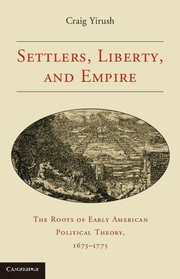Conclusion
Published online by Cambridge University Press: 05 June 2012
Summary
Settlers, Liberty, and Empire has traced the emergence of a distinctive settler strand of Anglo-American political thought in the crucial decades between the Glorious Revolution in America and the American Revolution against Britain. Confronted by a succession of centralizing initiatives emanating from London, settler elites drew on the common law and the early modern law of nature to defend their rights in a legally contested transatlantic empire. They supported this claim to equal rights by pointing to the risks they had taken to establish flourishing polities in a New World they persisted in seeing as a wilderness, inhabited by indigenous peoples whose sovereignty and property they had supplanted by purchase, conquest, and labor. This account of the rights of the English settlers in the empire was both coherent, based as it was on the fundamental right that each subject had to liberty and property throughout the king's dominions, and widely shared, being employed at moments of constitutional tension irrespective of whether the colonies using it to defend their autonomy were corporate, proprietary, or royal.
The result of this century-long debate about rights in the empire was the emergence of a revolutionary conception of political authority on the far side of the Atlantic in the decade leading up to 1776. Laid out in its fullest form in a series of late colonial pamphlets, it held that the settlers had a natural right to migrate from England, establish self-governing polities in America, and then delegate political authority to the Crown in return for the benefits of royal protection.
- Type
- Chapter
- Information
- Settlers, Liberty, and EmpireThe Roots of Early American Political Theory, 1675–1775, pp. 263 - 270Publisher: Cambridge University PressPrint publication year: 2011



